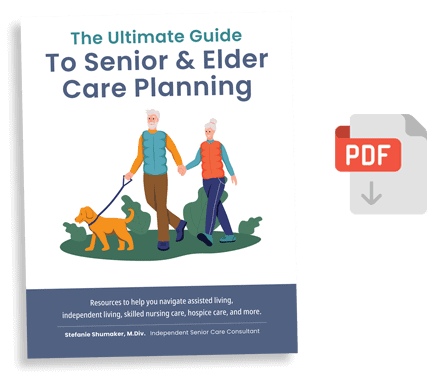The Ultimate Guide To Senior & Elder Care Planning
 By Stefanie Shumaker, M.Div.
By Stefanie Shumaker, M.Div.
Chapter 4: How to assess your elderly loved one’s financial situation?
It may take a lot of financial resources to meet the health care needs of your loved one and ensure a good quality of life as he or she ages. You will want to begin by learning the details of their financial situation:
1. Does he or she qualify for VA benefits or care? If yes, is he or she already set up with them? This process can take many months, so I would quickly identify a case worker with the VA who can help you complete the necessary paperwork and get this process started.
2. Does your loved one have a long-term care insurance plan? What does it cover?
3. Is there a savings account or trust set up to pay for care?
4. What is the value of their property? Do they have debts?
5. What is their medical insurance provider and what type of care will it cover?
 If your loved one has minimal financial resources, you may wish to enlist the help of a senior financial planner. This person could help determine whether or not your loved one qualifies for Medicaid which could assist with payment at certain types of care centers. Sometimes a group of siblings will each contribute a percentage of their own money on a monthly basis to pay for their parent’s or sibling’s care. Does your parent have a will? Has he or she paid for a funeral plan? Are one of you designated as the Power of Attorney, which will allow easier access to their financial records? Knowing and understanding your loved one’s financial situation is crucial.
If your loved one has minimal financial resources, you may wish to enlist the help of a senior financial planner. This person could help determine whether or not your loved one qualifies for Medicaid which could assist with payment at certain types of care centers. Sometimes a group of siblings will each contribute a percentage of their own money on a monthly basis to pay for their parent’s or sibling’s care. Does your parent have a will? Has he or she paid for a funeral plan? Are one of you designated as the Power of Attorney, which will allow easier access to their financial records? Knowing and understanding your loved one’s financial situation is crucial.


